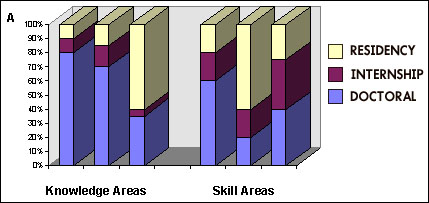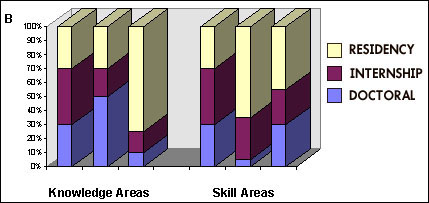Policy Statement
I. Preamble for conference.
Clinical neuropsychology is a specialty formally recognized by the American Psychological Association (APA) and the Canadian Psychological Association (CPA). Education and training in clinical neuropsychology has evolved along with the development of the specialty itself. Nevertheless, there has been no widely recognized and accepted description of integrated education and training in the specialty of clinical neuropsychology The aim of the Houston Conference was to advance an aspirational, integrated model of specialty training in clinical neuropsychology.
The Conference Planning Committee solicited participant applications by way of an announcement in the APA Monitor and letters to members of the Division of Clinical Neuropsychology (Division 40), the National Academy of Neuropsychology (NAN), and to the directors of training programs at the doctoral, internship, and postdoctoral levels as listed in The Clinical Neuropsychologist (Cripe, 1995). The committee selected a group of 37 clinical neuropsychologists to reflect diversity in practice settings, education and training models, specializations in the field of clinical neuropsychology, levels of seniority, culture, geographic location, and sex. Five additional delegates attended as representatives of the sponsoring neuropsychological organizations (NAN; Division 40; the American Board of Clinical Neuropsychology [ABCN]; the American Academy of Clinical Neuropsychology [AACN]; and the Association of Postdoctoral Programs in Clinical Neuropsychology [APPCN]). These delegates convened in Houston from September 3 through September 7, 1997. This document is the product of their deliberations. [Additional details may be found in the Proceedings of the Houston Conference.]
II. Introduction.
The following document is a description of integrated education and training in the specialty of clinical neuropsychology. It is predicated on the view that the training of the specialist in clinical neuropsychology must be scientist-practitioner based, and may lead to a combined, primarily practice, or primarily academic career.
The scientist-practitioner model (Belar & Perry, 1992) as applied to clinical neuropsychology envisions that all aspects of general neuropsychology and professional education and training should be integrated; this is the "horizontal" dimension of education and training. Integration should begin with doctoral education and should continue through internship and residency education and training; this is the "vertical" dimension of education and training.
This document presents a model of integrated education and training in the specialty of clinical neuropsychology that is both programmatic and competency-based (see Section XV below). This model defines exit criteria and provides tracks and means for obtaining these criteria across all levels of education and training. Exit criteria for the completion of specialty training are met by the end of the residency program. The programmatic level at which these criteria are achieved may vary but not the content.
III. Who is a clinical neuropsychologist?
A clinical neuropsychologist is a professional psychologist trained in the science of brain-behavior relationships. The clinical neuropsychologist specializes in the application of assessment and intervention principles based on the scientific study of human behavior across the lifespan as it relates to normal and abnormal functioning of the central nervous system.
IV. Who should have education and training in the specialty of clinical neuropsychology?
The clinical neuropsychologist's professional activities are included within the seven core domains delineated in the Petition for the Recognition of a Specialty in Professional Psychology submitted by Division 40 of the APA to the Commission for the Recognition of Specialties and Proficiencies in Professional Psychology (CRSPPP). These core domains are: assessment, intervention, consultation, supervision, research and inquiry, consumer protection, and professional development. The scientific activities of the specialist in clinical neuropsychology can vary widely. The specialist whose professional activities involve diverse cultural, ethnic, and linguistic populations has the knowledge and skills to perform those activities competently and ethically. The essential knowledge and skill competencies for these activities are outlined below.
VI. Knowledge base.
Clinical neuropsychologists possess the following knowledge. This core knowledge may be acquired through multiple pathways, not limited to courses, and may come through other documentable didactic methods.
1. Generic Psychology Core
Clinical neuropsychologists possess the following generic clinical skills and skills in clinical neuropsychology. These core skills may be acquired through multiple pathways, not limited to courses, and may come through other documentable didactic methods. Domains of skills and examples are:
Specialization in clinical neuropsychology begins at the doctoral level which provides the generic psychology and clinical core. In addition, it includes foundations for the study of brain-behavior relations and the practice of clinical neuropsychology. All of these are specified above in Sections VI and VII.
Doctoral education in clinical neuropsychology occurs at a regionally accredited institution. All basic aspects of the generic psychology and generic clinical cores should be completed at the doctoral level. The foundation of brain-behavior relationships should be developed to a considerable degree at this level of training. Yet, variability may occur between doctoral programs in the degree to which foundations of brain-behavior relationships and clinical neuropsychology practice are emphasized.
Entry and exit criteria for this level are those specified by the doctoral program.
IX. Internship training in clinical neuropsychology.
The purpose of the internship is to complete training in the general practice of professional psychology and extend specialty preparation in science and professional practice in clinical neuropsychology. The percentage of time in clinical neuropsychology should be determined by the training needs of the individual intern.
Internships must be completed in an APA or CPA approved professional psychology training program. Internship entry requirements are the completion of all graduate education and training requirements including the completion of the doctoral dissertation.
X. Residency education and training in clinical neuropsychology.
Residency education and training is designed to provide clinical, didactic and academic training to produce an advanced level of competence in the specialty of clinical neuropsychology and to complete the education and training necessary for independent practice in the specialty. The postdoctoral residency program is a required component in specialty education in clinical neuropsychology. The expected period of residency extends for the equivalent of two years of full-time education and training. The residency experience must occur on at least a half-time basis.
These programs will pursue accreditation supporting the following assurances.
Exit criteria for the residency are as follows:
In the future, subspecialties in clinical neuropsychology may be recognized (e.g., child, pediatric, geriatric, rehabilitation). In fact, many clinical neuropsychologists currently concentrate their professional and scientific activities in relatively focused areas of the clinical neuropsychology specialty. Thus, it is expected that some or all of these areas of concentration will eventually be seen as bona fide subspecialties. One implication of this view is that residencies may emerge that reflect concentrations in these subspecialties.
XII. Continuing education in clinical neuropsychology.
All specialists in clinical neuropsychology are expected to engage in annual continuing education. The goal of continuing education is to enhance or maintain the already established competence of clinical neuropsychologists by updating previously acquired knowledge and skills or by acquiring new knowledge or skills. Continuing education is not a method for acquiring core knowledge or skills to practice clinical neuropsychology or identify oneself as a clinical neuropsychologist. Continuing education also should not be the primary vehicle for career changes from another specialty area in psychology to clinical neuropsychology.
XIII. Diversity in education and training.
The specialty of clinical neuropsychology should attempt to actively involve (enroll, recruit) individuals from diverse backgrounds at all levels of education and training in clinical neuropsychology.
XIV. Application of the model.
This document is not to be applied retroactively to individuals currently trained or in training in the specialty of clinical neuropsychology. Individuals entering the specialty or training for the specialty of clinical neuropsychology prior to the implementation of this document are governed by existing standards as to the appropriateness of identifying themselves as clinical neuropsychologists.
XV. Model of Integrated Education and Training in Clinical Neuropsychology.
Figure 1 demonstrates how different degrees of specialty knowledge and skills (horizontal dimension) are acquired at various levels of training (vertical dimension). The model facilitates longitudinal integration and continuity in knowledge and skill acquisition with an emphasis that will vary according to level of training. The two charts show the education and training sequence for (A) an individual who acquires some of these areas primarily at the doctoral level and (B) an individual who acquires some of these areas to a lesser degree at the doctoral level and much greater degree at the internship and residency levels.


An illustration of an integrated model of education and training in clinical neuropsychology.
From: Hannay, H. J., Bieliauskas, L. A., Crosson, B. A., Hammeke, T. A., Hamsher, K. deS., & Koffler, S. P. (1998). Proceedings: The Houston Conference on Specialty Education and Training in Clinical Neuropsychology. Archives of Clinical Neuropsychology, [in press]. Copyright by the National Academy of Neuropsychology. Reproduced with permission.
Cripe, L. L. (1995). Special Division 40 presentation: Listing of Training Programs in Clinical Neuropsychology - 1995. The Clinical Neuropsychologist, 9, 327-398.
Belar, C. D., & Perry, N. W. (1992). National Conference on Scientist-Practitioner Education and Training for the Professional Practice of Psychology. American Psychologist, 47, 71-75.